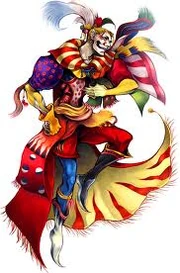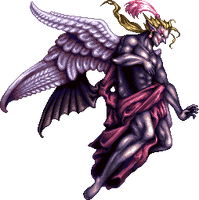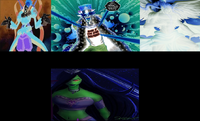
Kefka Palazzo is the main antagonist of Final Fantasy VI. He is one of the most famous villains in the Final Fantasy franchise and is widely regarded as the most evil of the villains.
History[]
Kefka is thirty-five years old and Emperor Gestahl's right-hand man. At least sixteen years ago Kefka was the first experimental Magitek Knight, which gifted him magical power, but shattered his sanity as the process had not been perfected yet. Kefka became a cruel, destructive madman, and acquired a reputation as one of the most dangerous men in the Gestahlian Empire. About six years after the procedure, the imperial military was restructured with Kefka and Leo Christophe being involved. Kefka used a slave crown to control Terra Branford—a half-human half-esper girl the emperor had kidnapped from the Esper World when she was but a baby who can use magic naturally. As a test of whether its enslaving effects were effective, Kefka had her burn fifty imperial soldiers alive.
Personality[]
Although initially Kefka seems lighthearted and silly, his true nature is maniacal, short-tempered, flamboyant, destructive, and cruel. This is a result of him having been made into a Magitek Knight before the process was perfected. He is a psychopath with no regard for human life nor remorse for the atrocities he commits, and revels in the suffering of others. He cracks dark jokes, breaks out into hysterical laughter upon causing mayhem, and his only joy is causing senseless destruction, death and chaos. Kefka doesn't even consider destruction fun unless lives are lost in the process. He lacks the capacity to feel empathy, implied by his line "We needn't show mercy to those who side with the Returners. ...which is good, because I never seem to have any of the stuff." His bio in Dissidia 012 Final Fantasy states he lacks self-control. He is ruthless, as evidenced by his briefing to his soldiers during their march to Narshe. Despite his insanity he is high-functioning enough to plot to access the Warring Triad and to betray his liege. He has no qualms with murdering many of his own men even for trivial reasons. It is implied Kefka is hated and feared by many Imperial soldiers for this reason.
When the Returners infiltrate the Magitek Research Facility Kefka claims he is all-powerful, and intends to become a god, suggesting he suffers from megalomania. After becoming a god he boasts the Returners have no chance against him. According to the Final Fantasy VI creation guide, he is narcissistic, being fascinated with the image in the mirror and dressing up for mirrors. This is implied in Dissidia with Kefka's mirror match quotes being compliments on the other Kefka's appearance. Kefka is a manchild, referring to fighting as "playing" and treating Terra as a doll to be toyed with. In the Japanese versions of Final Fantasy VI and Dissidia Final Fantasy, Kefka frequently uses the first-person pronoun boku-chin when referring to himself, a pronoun usually reserved for young boys, with small hints of this being shown in the localized version via him throwing tantrums at various points in the game. The Dissidia series also hints at his having crossdressing tendencies.
Kefka is characterized somewhat differently between the Japanese and international releases of Final Fantasy VI. In the former, his childish nature is emphasized, while in the western releases, he is depicted in a darker manner, shown knowing and enjoying the pain and suffering he inflicts on others.
What begins as a disregard to human life develops into nihilism, and at the end of Final Fantasy VI Kefka declares the lives of mortals insignificant finding no meaning in things like love and hope, and seeks to destroy the bonds of existence itself. When gloating about unlocking the ultimate power, depending on the version, he either wishes to exterminate everything and everyone (SNES and PS versions), or otherwise simply let people die out and encourages the Returners to embrace their own destruction (GBA, PC, and iOS versions). He finds the concepts of love and hope nauseating, and finds the Returners' examples of finding meaning for life in a ruined world sickening. He has a similar reaction in Dissidia, when he, deducing that Terra and Onion Knight are still friends after their battle, declares that it makes him "want to puke [his] guts out."
Dissidia Final Fantasy shows a more tragic view of Kefka's insanity. Once he is defeated in Shade Impulse, Kefka laments on the futility of life in a soliloquy mirroring his speech in Final Fantasy VI, and fades with a sad laughter. Terra speculates Kefka destroys to fill his broken heart. In Dissidia 012 Final Fantasy before the battle, she wonders if Kefka is being tormented when he repeatedly chants "destroy". Kefka's Dissidia 012 Final Fantasy Museum profile mentions he self-destructed to make himself feel better. This depression relating to his nihilism and being incapable of understanding means other than destruction to give meaning to life was hinted at in the original game when the Returners state what they hold on to to persevere in the World of Ruin. Kefka briefly pauses, as if sad, before ranting that he'll get rid of all dreams. In his god form boss fight in Final Fantasy XIV, Kefka declares that utter ruin is the only thing that will suffice.
In the Japanese versions, owing to his childish nature, he often uses the first-person pronouns boku and boku-chin, though he adopts the formal gender-neutral term watashi just prior to fighting the Returners for the final time, presumably indicating he was superior to everyone else by that point.
Relationships[]
Terra (Final Fantasy)[]
The Joker[]
Sweet Tooth[]
Piedmon[]
Taki []
Saber/King Arturia Pendragon []
Batman[]
Sheena Fujibayashi[]
Samus Aran[]
Tuxedo Lovelace vs CarnEvil[]
TBA
LOTM - Birth of Miracle Elite[]
TBA
Legends of the Multi-Universe: Armageddon[]
Kefka Palazzo debuts as a supporting antagonist. He's the secondary main antagonist in The Clowns Arc.
LOTM: Weirdmageddon[]
Kefka returns as one of the major antagonists.

























